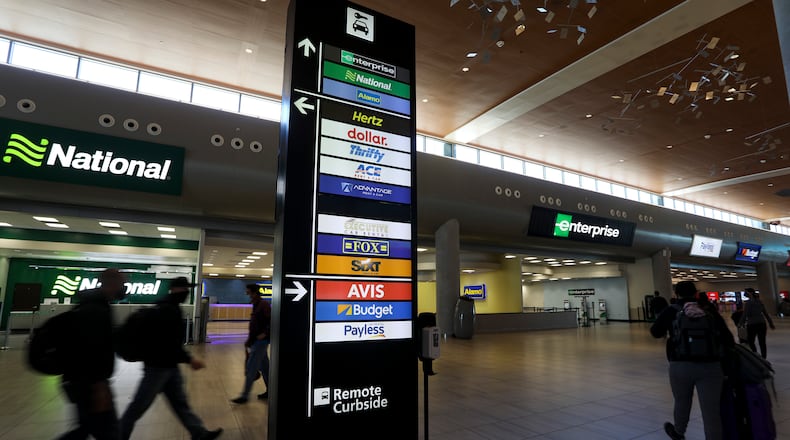ORLANDO, Fla. — Ra Brave arrived last week with his wife and son at the Orlando International Airport for a five-day stay. But after a year with most Americans avoiding long-distance travel, the real estate agent from Baltimore discovered a new challenge: getting around in the city.
“There are no cars available at all,” Brave said after being turned away at rental car desk after rental car desk at the airport. Agents at desks for Enterprise and National confirmed that every available vehicle they had that day was already reserved.
Battered by the COVID-19 pandemic, rental car companies are facing a national car shortage, causing availability for travelers to plummet and daily rental rates to spike to as high as nearly $500 a day in Tampa.
“I think madhouse is probably a good way to describe it,” said Jonathan Weinberg, CEO of AutoSlash.com, a website that aggregates discounts for car rentals. “We are benefiting in some ways from the madness. The problem is that in many cases we just can’t find cars for people.”
As the pandemic got underway in March of last year, car rentals plummeted by 90%, according to Weinberg. Over the year, rentals gradually returned but not before rental companies made the decision to sell off thousands of vehicles in order to stay afloat.
“I think madhouse is probably a good way to describe it. We are benefiting in some ways from the madness. The problem is that in many cases we just can't find cars for people."
“They have a whole lot less cars than in 2019,” Weinberg said. “Even if the industry is back 80%, they have 30 to 40% less cars. The prices are just skyrocketing.”
Many rental car companies moved inventory to Florida and other tourist locations at the start of the year to attempt to serve returning travelers, but the move fell short in some places. Over holiday weekends in February, 18 out of 20 Florida airports were entirely out of cars, according to Weinberg.
The shortages can even vary by just a few miles. Weinberg said Orlando has fared better than some of the rest of the state, even though he points out rental prices are running $50 to $100 per day, more than double the average rates he saw in 2019.
But Weinberg pointed to the Tampa-St. Petersburg region as an “area of concern,” saying weekend rentals from Tampa’s airport are going for as much as $489 per day.
Weinberg isn’t optimistic that this will get better in the short term.
“As you get into March and April, people start to head back North,” he said, meaning the cars will need to head north as well. “Eventually the demand is going to turn, and it’s going to happen very quickly.”
Rental car companies are trying to rebuild their fleets, but buying new cars presents its own challenges. Several automobile factories shut down at the beginning of the pandemic, leaving car dealers and rental agencies competing for new cars off the line.
Then there is the global shortage of microchips. Production was hampered by the pandemic and further slammed this year when the ice storm in Texas shut down manufacturing and a fire in Japan delayed production at another factory.
Such chips are essential components in new cars, thus further restricting new inventory. The lack of supply has reached such a crisis that the White House convened a summit to address the issue Monday.
“I don’t think we’re going to see any relief coming on that end for a long time,” Weinberg said.
About the Author
The Latest
Featured


